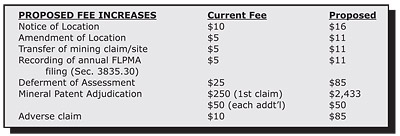All Articles
Free
Legislative and Regulatory Update
September 2005 by Scott
• BLM proposes another fee increase
After we went to press with the August issue, the Bureau of Land Management (BLM) published a proposal to increase cost recovery fees.
BLM propose charging $171 to record a mining claim, which would include the $125 maintenance fee.
Mineral patent adjudication fees would increase from $250 to $2,433 for an initial claim and $50 for each additional claim in the patent application. (The moratorium on new patents is still in place.)

Mineral leases may also go up substantially, but fees will be determined on a case-by-case basis.
Oil and gas companies would be hit the hardest under the proposal. An application for a permit to drill (APD) would cost $1,600 in fiscal 2006, and would climb by $500 each year for five years to $4,000.
We have asked for an extension on the comment period on behalf of our readers. The Northwest Mining Association has also requested an extension of the comment deadline. The original comment period was due to close on August 18. We expect the comment period will be extended, and suggest you send in your comments based on that expectation.
Comments can be mailed to:
Mail Director (630)
Bureau of Land Management
Eastern States Office
7450 Boston Blvd.
Springfield, VA 22153.
Comments can be emailed to:
Comments_washington@blm.gov
Submitted comments must include a reference to RIN 1004-AC64 at the beginning of the document to be routed appropriately.
The Federal Register document can be viewed on the Internet at www.regulations.gov/freddocs/05-13613.htm
• Old Roadless Rule blocked
Environmentalists’ attempt to restore the Clinton-era Roadless Rule was thwarted by a three-judge panel of the 10th US Circuit Court of Appeals.
The Wyoming Outdoor Council and seven other environmental groups had appealed a ruling handed down in 2003 that stated the executive branch overstepped its authority by effectively creating wilderness areas without the approval of Congress.
The Forest Service issued a new rule on May 5 that replaced the one that was overturned. The new rule gives governors until late 2006 to present a plan for roadless areas.
“Adoption of the new rule has rendered the appeal moot,” said the statement issued by the three-judge panel.
• County attempt to regulate leaching thwarted
The Colorado Mining Association was successful in its lawsuit against Summit County’s ban on the use of cyanide for gold processing.
District Judge David R. Lass ruled that only the state Mined Land Reclamation Board has the authority to regulate the use of cyanide in mining operations and the county exceeded its authority.
Stuart Sanderson, president of the Colorado Mining Association, said the ruling could make vulnerable similar bans in Conejos, Costilla, Gilpin and Gunnison counties.
• Canyon fights on
“We are optimistic that our claims will be heard by the Federal District Court because we believe that we have a valid case worthy of their consideration,” said James Hesketh, president of Canyon Resources.
Canyon Resources lost its bid in the Montana Supreme Court for compensation after Initiative 137 outlawed the use of cyanide at its Seven-Up Pete Joint Venture project. It had filed claims in state and federal courts at the same time, but the federal case was put on hold until conclusion of the state case. Canyon had spent $70 million developing the project before passage of I-137 in 1998.
The federal case should be allowed to proceed because it will focus on a crucial distinction between federal and state law, said Alan Joscelyn, attorney for Canyon Resources.
Unlike state law, federal law treats the contract rights established by the state issuing mineral leases to the company as protected property even if the leases did not guarantee the company eventually would be allowed to mine, he said.
“The venture had a right to believe the state, in good faith, would let the venture complete the permitting process and have the opportunity to develop the project,” said Joscelyn. “We believe that this is a contract and property rights issue where contracts have been voided and property values taken with no compensation.”
• New wilderness passes Senate; faces uphill battle in House
The Senate approved four wilderness bills, though the bills may have a tough time getting through the House Resources Committee. Chairman Richard Pombo has placed firm guidelines for wilderness legislation and the bills may not make it out of his committee.
The Northern California Coastal Wild Heritage Wilderness Act (S 128) would ban development and mining on more than 300,000 acres managed by the BLM and Forest Service.
The Wild Sky wilderness (S 152) in the Mt. Baker-Snoqualmie National Forest would place 106,000 acres off limits in Washington State.
Senate Bill 272 would create the Toro Wilderness Area in Puerto Rico.
The Ojito wilderness area, encompassing 11,000 acres in Sandoval County, New Mexico, was passed as Senate Bill 156.
Those with opinions on the proposed wilderness designations are encouraged to submit their constructive comments to the House Resources Committee.
Comments can be sent by mail to:
Chairman Richard W. Pombo
1324 Longworth House Office Bldg
Washington, DC 20515
Comments can be sent by email to: resources.committee@mail.house.gov![]()
© ICMJ's Prospecting and Mining Journal, CMJ Inc.